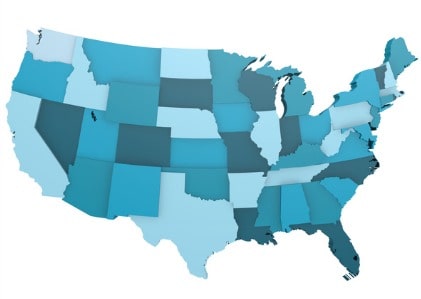Solar Panel Installation & Maintenance Training Programs
From certificates to two-year degrees, the options that are available to those interested in solar panel installation training vary. Below, we provide a look at some of these options and hope through them you can gain a better understanding of some of your choices:
The Training Center
The Training Center, in Harker Heights, Texas, offers a certification for solar energy technicians that is 6 weeks in length. Students learn how to apply basic engineering principles and technical skills in a hybrid laboratory and classroom environment. They also learn about solar energy principles, inspection and testing procedures, energy storage and transfer technologies, report preparation, and system maintenance procedures.
Comprising 120 clock-hours, this program includes the following six modules:
- Photovoltaic fundamentals – Students in this module will learn about performing hazard analysis, identifying job site hazards, implementing ladder safety, implementing fall protection plans, and understanding the fundamentals of electric utility system operations, among others.
- Photovoltaic system design – This includes understanding basic electrical parameters such as electrical charge, voltage, current, resistance, and power, identifying electrical test equipment, performing site analysis, designing rooftop photovoltaic solar systems, and performing system sizing.
- Photovoltaic grid-tie systems – The objectives for this module include performing the installation of a rooftop grid-tied system, understanding the requirements for roofing systems, and comparing and contrasting the benefits and features of different photovoltaic arrays mounting systems.
- Photovoltaic stand-alone systems – This involves installing a stand-alone system, understanding the operation of batteries, and identifying the requirements for charge controller installations and applications.
- Photovoltaic construction management – This construction project management module involves performing a survey, preparing a proposal, plan an installation, and identifying safety practices.
- Photovoltaic system interconnection – The final module in this program includes identifying code requirements, identifying all required tests, identifying all required inspections, and understanding the maintenance and operations of a photovoltaic solar system.
Students are prepared to enter the workforce immediately after graduation and support engineers and other professionals in installing photovoltaic systems.
- Location: Harker Heights, TX
- Accreditation: N/A
- Expected Time to Completion: Six weeks
- Estimated Tuition: $5,998.99
Indian River State College
Indian River State College in Fort Pierce, Florida, offers an electronics engineering technology degree that includes several specializations such as biomedical electronics, computer technology, laser-photonics, robotics-manufacturing, solar energy, and telecommunications.
The associate degree in electronics engineering technology solar energy specialization consists of 68 credits and includes courses such as AC and DC circuits, electronic devices, introduction to photonics, troubleshooting and repair techniques, programmable logic controllers, and solar thermal systems, among others.
Students here will also have the option to earn technical certificates at the same time they’re completing their AS degree. The solar energy technical certificate is a 12-credit where the coursework will include four three-level classes that include DC circuits, AC circuits, solar thermal systems, and solar photovoltaic systems.
- Location: Fort Pierce, FL
- Accreditation: Southern Association of Colleges and Schools Commission on Colleges (SACSCOC)
- Expected Time to Completion: AS degree (five semesters)
- Estimated Tuition: Florida Resident ($103.83 per credit); Non-Florida Resident ($390.49)
Midwest Renewable Energy Association
Midwest Renewable Energy Association’s Solar Training Academy offers a certificate program to become a solar installer at seven campuses across Minnesota, Wisconsin, Iowa, and Illinois. For professionals starting their solar careers, the Solar Training Academy offers engaging industry-leading solar technical training through online coursework via Moodle, Zoom meetings, and in-person labs.
With no prerequisites required this program is for anyone interested in learning about designing and installing their PV system. Upon completion, graduates will be qualified to sit for the North American Board of Certified Energy Practitioners (NABCEP) PV Associate Exam, a credential valued by the industry.
Classes include PV site assessment, PV system design, basic photovoltaics, PV exam prep, PV labs and design scenarios, working with electricity, and navigating the NEC.
- Location: Milwaukee, WI
- Accreditation: N/A
- Expected Time to Completion: Contact MREA for details
- Estimated Tuition: MREA members ($1,799); Non-members ($1,899)
Delaware Technical Community College
Delaware Technical Community College offers a renewable energy solar associate degree that can prepare students for employment positions such as PV Installer, PV technical salesperson, or solar thermal technician. The program helps students in developing energy analysis skills for improving energy efficiency and the application of renewable energy solar systems. They will also learn about designing and installing solar photovoltaic systems and solar thermal applications.
This degree requires a minimum completion of 66 credits and features courses such as introduction to energy management, safety basics, electrical safety, solar policy and financing, lighting applications, sustainability and society, and photovoltaic systems.
The program will prepare students to take the NABCEP entry-level exam. Graduates will be able to calculate and verify the energy use of buildings, make recommendations for optimized building performance by evaluating residential buildings, present technical reports, analyze the environmental, business, and economic implications of energy measures, and perform in-depth site and customer suitability evaluation.
- Location: Dover, DE
- Accreditation: Middle States Commission on Higher Education
- Expected Time to Completion: 2 years
- Estimated Tuition: In-state ($152.50 per credit); Out-of-State ($381.25 per credit)
Crowder College
Crowder College in Neosho, Missouri, actually offers both an associate of arts and an associate of applied science (AAS) degree in alternative energy (solar), as well as a certificate that could be of interest to those wanting solar energy technician training. These programs provide students with a solid applied foundation in solar applications and technologies.
The associate of arts (AA) degree is made up of 65 credits, while the associate of applied science (AAS) degree requires completion of 64 credits. The active solar technician consists of 23 credits.
The curriculum includes courses such as occupational safety, solar thermal systems, passive solar, solar electric energy, trigonometry, and fundamentals of speech, among others. Students will be required to take the NABCEP Solar PV exam as part of the solar electric energy course.
- Location: Neosho, MO
- Accreditation: Higher Learning Commission of the North Central Association
- Expected Time to Completion: Associate degree (two years); certificate (one year)
- Estimated Tuition: In-district ($114.00 per credit); out-of-district/state ($184.00 per credit)
Clinton Community College
State University of New York’s Clinton Community College offers an associate of applied science and a certificate program in renewable energy technologies preparing students for entry-level positions by teaching them about the construction, installation, and maintenance of wind and solar electricity generating systems which apply to both light commercial and residential systems.
The certificate consists of 32 credits involving courses in maths, English, science, computer science, electrical circuits, photovoltaic systems theory and design, photovoltaic systems installation and maintenance, industrial electricity, blueprint reading and technical schematics, and safety at height and rescue. All courses in this certificate can be applied to the AAS degree.
The associate’s degree comprises 60 credits with additional coursework in electronics, industrial health and safety, instrumentation, and power generation and delivery.
Graduates of the AAS degree program ready for immediate employment in the renewable energy field. They can take up roles such as wind turbine technician, solar systems installer, assembler, and electrical technician.
- Location: Plattsburgh, NY
- Accreditation: Middle States Commission on Higher Education (MSCHE)
- Expected Time to Completion: AAS (two years); certificate (nine months)
- Estimated Tuition: NY State residents ($230 per credit); non-residents ($400 per credit)
Greenfield Community College
Greenfield Community College offers a full-time certificate program in renewable energy/energy efficiency providing students with a comprehensive introduction to renewable energy and energy efficiency. They will be prepared for entry-level employment opportunities in the renewable energy/energy efficiency field.
The program requires successful completion of 28 to 29 credits including courses such as residential energy efficiency and energy auditing, sustainable landscape design, fundamentals of wind energy, solar thermal systems, and applied residential energy auditing.
The college also offers an associate in arts degree in renewable energy/energy efficiency which consists of 60 to 62 credits. All courses earned in the certificate can be applied towards this degree.
- Location: Greenfield, MA
- Accreditation: New England Commission of Higher Education (NECHE)
- Expected Time to Completion: AA (two years); certificate (one year)
- Estimated Tuition: $26 per unit
Salt Lake Community College
Salt Lake Community College offers an associate of applied science degree in energy management preparing students to identify and implement energy efficiency measures through sustainable practices. Providing hands-on experience, the program will help students learn about the fundamentals of energy and gain a solid understanding of the energy systems in commercial, industrial, and residential facilities. This program can also be a good fit for working professionals as some of its classes are offered entirely online.
Consisting of 67 credits, the program includes courses such as residential building energy, clean energy technologies, energy accounting for business, selling energy efficiency, energy auditing field methods, basic photovoltaics systems, and industrial energy efficiency, among others.
At the end of the program, graduates can pursue opportunities such as Energy Manager, Facilities Operator, Energy Auditor, Energy Efficiency Consultant, Renewable Energy Specialist, sustainability Manager, and more.
- Location: Salt Lake City, UT
- Accreditation: Northwest Commission on Colleges and Universities
- Expected Time to Completion: 18 months
- Estimated Tuition: Resident ($238.75 per credit); non-resident ($669.75 per credit)
Shoreline Community College
An associate in applied arts and sciences (AAAS) degree and a certificate in clean energy technology and entrepreneurship offered by Shoreline Community College prepares students with the practical and theoretical knowledge necessary for careers in firms that design, manage, build, operate, or market clean energy technologies in the built environment.
The certificate is made up of 45 credits and all courses earned in the certificate can be applied towards the AAAS degree which consists of 90 credits. The curriculum includes courses such as Introduction to battery technology, solar electric design and applications, advanced PV design, battery-based PV system design, and sustainable business strategies, among others.
On successful completion of the program, graduates can take up roles such as building energy analysts, renewable energy or high performing systems designers, energy management specialists, facilities operations, commissioning specialists, and project managers.
- Location: Shoreline, WA
- Accreditation: Northwest Commission on Colleges and Universities
- Expected Time to Completion: AAAS (two years); certificate (one year)
- Estimated Tuition: WA-Resident ($152.13 per credit); Non-WA resident ($243.46 per credit)
Mid-State Technical College
Mid-State’s associate in applied science degree in renewable energy technician program prepares students to design a portfolio of traditional and renewable energy-producing systems. They will be prepared for a variety of tasks such as performing site assessments, selling and marketing renewable energy technologies, managing installation projects, and recommending appropriate renewable energy technologies.
Made up of 60 credits, the program includes courses such as renewable energy overview, piping applications, photovoltaic system design and installation, electrical controls and systems for buildings, sustainable heating system design and installation, and HVAC air conditioning fundamentals, among others.
The program opens up several opportunities for graduates. They can take up roles such as customer service representative, installation assistant, renewable energy specialist, solar applications technician, site assessor, and project manager, to name a few.
- Location: Wisconsin Rapids, WI
- Accreditation: Higher Learning Commission (HLC)
- Expected Time to Completion: Two years
- Estimated Tuition: $10,925.75 for the entire program



